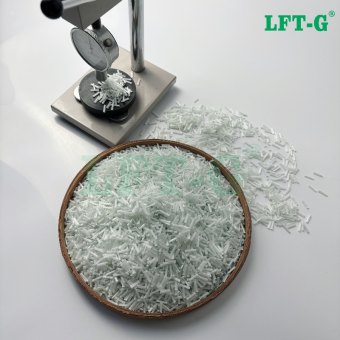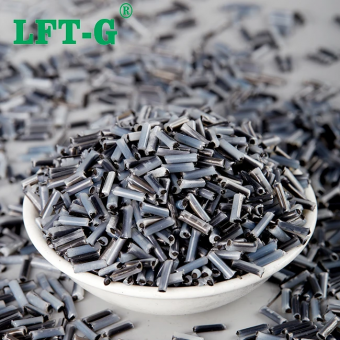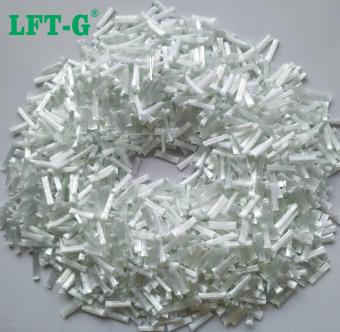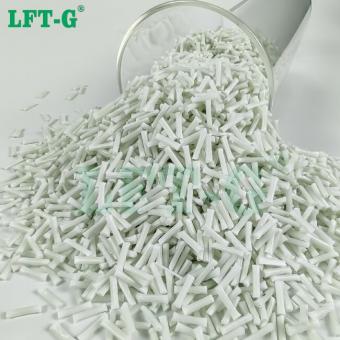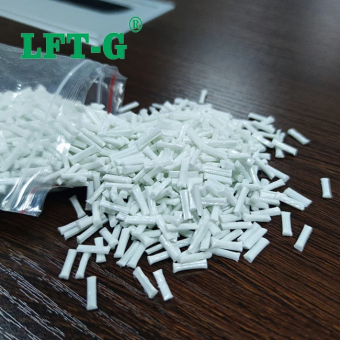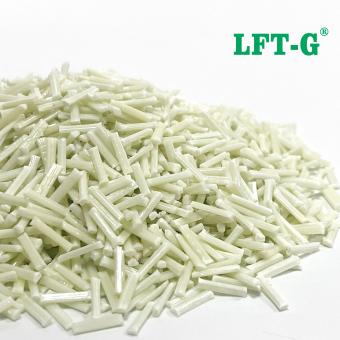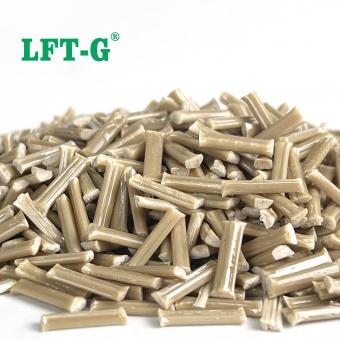-
2023 New MXD6 meta-xylylene adipamide nylon Long glass fiber filling 30% high barrier propertiesWhat is MXD6? Conventional aliphatic nylon is easy to process but has strong water absorption and low glass conversion temperature. Although all-aromatic nylon has solved the shortcomings of aliphatic products to a large extent, the processing difficulty has increased exponentially. After 1972, Toyo Textile and Mitsubishi Gas Chemical synthesized a new kind of semi-aromatic nylon MXD6, which not only overcame the disadvantages of aliphatic and all-aromatic resins to a large extent, but also had some advantages of all-aromatic resins. It is widely used in packaging materials with high gas barrier and engineering structural materials. In summary, MXD6 has the following advantages: High strength and elastic modulus; The high glass transition temperature is 237℃ for Tm and 85℃ for Tg. Low water absorption and moisture permeability; Fast crystallization speed, easy to form and manufacture; Excellent gas barrier performance. Why add Long Glass Fiber? Long glass fiber reinforced composite can solve your problems when other methods of reinforced plastics do not provide the performance you need or if you want to replace matal with plastic. Long Glass Fiber reinforced composites can cost-effectively reduce the cost of goods and effectively improve the mechanial properties of engineering internal skeleton network. Performance is preserved in a wide range of environments. MXD6 performance and application Compared with other materials, MXD6 has the advantages of high strength and elastic modulus, high glass transition temperature, low water absorption and moisture permeability, fast crystallization speed, convenient molding and manufacturing, excellent gas barrier properties, and can also be a good barrier to carbon dioxide and oxygen even under high humidity. In the end market, MXD6 is rarely used alone and is generally added to other polymers as a modified component. Materials containing MXD6 are mainly used in automotive and packaging fields. As an engineering plastic, MXD6 can replace the use of metal materials in the automotive industry, such as power tools, magnetic materials, automotive shell, chassis, girders, engine accessories, etc. We will offer you: 1) LFT & LFRT material technical parameters and leading edge design; 2) Mold front design and recommendations; 3)Provide technical support such as injection molding and extrusion molding. System Certification Quality Management System ISO9001/1949 Certification National Laboratory Accreditation Certificate Modified Plastics Innovation Enterprise Honorary Certificate Heavy metal REACH & ROHS testing
- New material
- Polycondensation product
- Crystalline polymer
- Special nylon
- Polyamide fibre
- Long glass fiber composite
Tags :
-
LFT-G PPS Polyphenylene sulfide composite long glass fiber thermoplastic resin original colorPPS information The resin matrix of thermoplastic composites involves general and special engineering plastics, and PPS is a typical representative of special engineering plastics, commonly known as "plastic gold". Performance advantages include the following aspects: excellent heat resistance, good mechanical properties, corrosion resistance, self-flame retardant up to UL94 V-0 level. Because PPS has the advantages of the above properties, and compared with other high performance thermoplastic engineering plastics and has the characteristics of easy processing, low cost, so it becomes an excellent resin matrix for manufacturing composite materials. PPS composite material PPS filling short glass fiber (SGF) composite material has the advantages of high strength, high heat resistance, flame retardant, easy processing, low cost, and has been applied in automotive, electronics, electrical, machinery, instruments, aviation, aerospace, military and other fields. PPS filling long glass fiber (LGF) composite material has the advantages of high toughness, low warpage, fatigue resistance, good product appearance and so on. It can be used in water heater impeller, pump shell, joint, valve, chemical pump impeller and shell, cooling water impeller and shell, household appliance parts and so on. What are the specific differences between short glass fiber (SGF) and long glass fiber (LGF) reinforced PPS composites? 1. Mechanical property analysis The reinforcement fiber added in the resin matrix can form a supporting skeleton, and the reinforcement fiber can effectively bear the external load when the composite is subjected to external force. At the same time, energy can be absorbed by fracture, deformation and other ways to improve the mechanical properties of resin. The tensile strength and bending strength of the composites are gradually increased by increasing the amount of glass fiber. The main reason is that when the glass fiber content increases, more glass fiber in the composite material can withstand the action of external force. Meanwhile, due to the increase in the number of glass fibers, the resin matrix between the glass fibers becomes thinner, which is more conducive to the construction of glass fiber reinforced frame. Therefore, with the increase of glass fiber content, more stress is transferred from resin to glass fiber under external load, which effectively improves the tensile and bending properties of composite materials. The tensile and bending properties of PPS/LGF composites are higher than those of PPS/SGF composites. When the glass fiber mass fraction is 30%, the tensile strength of PPS/SGF and PPS/LGF composites is 110MPa and 122MPa, respectively. The bending strength was 175MPa and 208MPa, respectively. The flexural elastic modulus were 8GPa and 9GPa, respectively. The tensile strength, bending strength and bending elastic modulus of PPS/LGF composites are increased by 11.0%, 18.9% and 11.3% compared with PPS/SGF composites, respectively. PPS/LGF composites have higher length retention rate of glass fiber. Under the condition of the same glass fiber content, the composites have stronger load resistance and better mechanical properties. When the glass fiber content is low, the impact strength of the composite decreases. The main reason is that the lower glass fiber content cannot form a good stress transfer network in the composite material, so that the glass fiber exists in the form of defects under the impact load of the composite material, resulting in the overall impact strength of the composite material is reduced. With the increase of the glass fiber content, the glass fiber in the composite can form an effective spatial network, and the reinforcement effect is greater than that of the glass fiber tip. Under the action of external load, the external load can be transferred to the reinforced fiber better, thus improving the overall performance of the composite. In the PPS/LGF system, the length of the glass fiber is longer and the spatial network is more dense. The reinforced glass fiber has greater bearing capacity and better impact strength. When the mass fraction of glass fiber is 30%, the impact strength of PPS/LGF is increased by 19.4% from 31kJ/m2 to 37kJ/m2, and the notch impact strength is increased by 54.5%(from 7.7kJ/m2 to 11.9kJ/m2). 2. Thermal properties analysis of PPS/SGF and PPS/LGF composites When the mass fraction of glass fiber is 30%, the thermal deformation temperature of PPS/SGF composite and PPS/LGF composite reaches 250℃ and 275℃, respectively. The thermal deformation temperature of PPS/LGF composite is 10% higher than that of PPS/SGF composite. The main reason is that the introduction of glass fiber makes the network skeleton of reinforced fiber formed inside the composite material, which greatly improves the heat resistance of the composite material. The size of glass fiber in PPS/LGF is longer, and the heat resistance improvement advantage is more obvious....
- New high performance thermoplastic resin
- A crystalline polymer
- Long glass fiber filling plastic
- Customized material
- Industrial raw material
- High impact resistance
Tags :
-
Xiamen LFT-G MXD6 meta-xylylene adipamide nylon Long glass fiber filling 30% high barrier propertiesWhat is MXD6? Conventional aliphatic nylon is easy to process but has strong water absorption and low glass conversion temperature. Although all-aromatic nylon has solved the shortcomings of aliphatic products to a large extent, the processing difficulty has increased exponentially. After 1972, Toyo Textile and Mitsubishi Gas Chemical synthesized a new kind of semi-aromatic nylon MXD6, which not only overcame the disadvantages of aliphatic and all-aromatic resins to a large extent, but also had some advantages of all-aromatic resins. It is widely used in packaging materials with high gas barrier and engineering structural materials. In summary, MXD6 has the following advantages: High strength and elastic modulus; The high glass transition temperature is 237℃ for Tm and 85℃ for Tg. Low water absorption and moisture permeability; Fast crystallization speed, easy to form and manufacture; Excellent gas barrier performance. Why add Long Glass Fiber? Long glass fiber reinforced composite can solve your problems when other methods of reinforced plastics do not provide the performance you need or if you want to replace matal with plastic. Long Glass Fiber reinforced composites can cost-effectively reduce the cost of goods and effectively improve the mechanial properties of engineering internal skeleton network. Performance is preserved in a wide range of environments. MXD6 performance and application Compared with other materials, MXD6 has the advantages of high strength and elastic modulus, high glass transition temperature, low water absorption and moisture permeability, fast crystallization speed, convenient molding and manufacturing, excellent gas barrier properties, and can also be a good barrier to carbon dioxide and oxygen even under high humidity. In the end market, MXD6 is rarely used alone and is generally added to other polymers as a modified component. Materials containing MXD6 are mainly used in automotive and packaging fields. As an engineering plastic, MXD6 can replace the use of metal materials in the automotive industry, such as power tools, magnetic materials, automotive shell, chassis, girders, engine accessories, etc. We will offer you: 1) LFT & LFRT material technical parameters and leading edge design; 2) Mold front design and recommendations; 3)Provide technical support such as injection molding and extrusion molding. System Certification Quality Management System ISO9001/1949 Certification National Laboratory Accreditation Certificate Modified Plastics Innovation Enterprise Honorary Certificate Heavy metal REACH & ROHS testing
- New material MX-Nylon plastic
- Polycondensation product mxd6
- Crystalline polymer reinforced plastic
- Special nylon Polyxylylene
- Polyamide fibre made in China
Tags :
-
Xiamen LFT-G MXD6 meta-xylylene adipamide nylon Long glass fiber filling 30% high barrier propertiesWhat is MXD6? Conventional aliphatic nylon is easy to process but has strong water absorption and low glass conversion temperature. Although all-aromatic nylon has solved the shortcomings of aliphatic products to a large extent, the processing difficulty has increased exponentially. After 1972, Toyo Textile and Mitsubishi Gas Chemical synthesized a new kind of semi-aromatic nylon MXD6, which not only overcame the disadvantages of aliphatic and all-aromatic resins to a large extent, but also had some advantages of all-aromatic resins. It is widely used in packaging materials with high gas barrier and engineering structural materials. In summary, MXD6 has the following advantages: High strength and elastic modulus; The high glass transition temperature is 237℃ for Tm and 85℃ for Tg. Low water absorption and moisture permeability; Fast crystallization speed, easy to form and manufacture; Excellent gas barrier performance. Why add Long Glass Fiber? Long glass fiber reinforced composite can solve your problems when other methods of reinforced plastics do not provide the performance you need or if you want to replace matal with plastic. Long Glass Fiber reinforced composites can cost-effectively reduce the cost of goods and effectively improve the mechanial properties of engineering internal skeleton network. Performance is preserved in a wide range of environments. MXD6 performance and application Compared with other materials, MXD6 has the advantages of high strength and elastic modulus, high glass transition temperature, low water absorption and moisture permeability, fast crystallization speed, convenient molding and manufacturing, excellent gas barrier properties, and can also be a good barrier to carbon dioxide and oxygen even under high humidity. In the end market, MXD6 is rarely used alone and is generally added to other polymers as a modified component. Materials containing MXD6 are mainly used in automotive and packaging fields. As an engineering plastic, MXD6 can replace the use of metal materials in the automotive industry, such as power tools, magnetic materials, automotive shell, chassis, girders, engine accessories, etc. We will offer you: 1) LFT & LFRT material technical parameters and leading edge design; 2) Mold front design and recommendations; 3)Provide technical support such as injection molding and extrusion molding. System Certification Quality Management System ISO9001/1949 Certification National Laboratory Accreditation Certificate Modified Plastics Innovation Enterprise Honorary Certificate Heavy metal REACH & ROHS testingview more
-
Xiamen LFT-G PPS Polyphenylene sulfide composite long glass fiber thermoplastic original colorPPS information The resin matrix of thermoplastic composites involves general and special engineering plastics, and PPS is a typical representative of special engineering plastics, commonly known as "plastic gold". Performance advantages include the following aspects: excellent heat resistance, good mechanical properties, corrosion resistance, self-flame retardant up to UL94 V-0 level. Because PPS has the advantages of the above properties, and compared with other high performance thermoplastic engineering plastics and has the characteristics of easy processing, low cost, so it becomes an excellent resin matrix for manufacturing composite materials. PPS composite material PPS filling short glass fiber (SGF) composite material has the advantages of high strength, high heat resistance, flame retardant, easy processing, low cost, and has been applied in automotive, electronics, electrical, machinery, instruments, aviation, aerospace, military and other fields. PPS filling long glass fiber (LGF) composite material has the advantages of high toughness, low warpage, fatigue resistance, good product appearance and so on. It can be used in water heater impeller, pump shell, joint, valve, chemical pump impeller and shell, cooling water impeller and shell, household appliance parts and so on. What are the specific differences between short glass fiber (SGF) and long glass fiber (LGF) reinforced PPS composites? 1. Mechanical property analysis The reinforcement fiber added in the resin matrix can form a supporting skeleton, and the reinforcement fiber can effectively bear the external load when the composite is subjected to external force. At the same time, energy can be absorbed by fracture, deformation and other ways to improve the mechanical properties of resin. The tensile strength and bending strength of the composites are gradually increased by increasing the amount of glass fiber. The main reason is that when the glass fiber content increases, more glass fiber in the composite material can withstand the action of external force. Meanwhile, due to the increase in the number of glass fibers, the resin matrix between the glass fibers becomes thinner, which is more conducive to the construction of glass fiber reinforced frame. Therefore, with the increase of glass fiber content, more stress is transferred from resin to glass fiber under external load, which effectively improves the tensile and bending properties of composite materials. The tensile and bending properties of PPS/LGF composites are higher than those of PPS/SGF composites. When the glass fiber mass fraction is 30%, the tensile strength of PPS/SGF and PPS/LGF composites is 110MPa and 122MPa, respectively. The bending strength was 175MPa and 208MPa, respectively. The flexural elastic modulus were 8GPa and 9GPa, respectively. The tensile strength, bending strength and bending elastic modulus of PPS/LGF composites are increased by 11.0%, 18.9% and 11.3% compared with PPS/SGF composites, respectively. PPS/LGF composites have higher length retention rate of glass fiber. Under the condition of the same glass fiber content, the composites have stronger load resistance and better mechanical properties. When the glass fiber content is low, the impact strength of the composite decreases. The main reason is that the lower glass fiber content cannot form a good stress transfer network in the composite material, so that the glass fiber exists in the form of defects under the impact load of the composite material, resulting in the overall impact strength of the composite material is reduced. With the increase of the glass fiber content, the glass fiber in the composite can form an effective spatial network, and the reinforcement effect is greater than that of the glass fiber tip. Under the action of external load, the external load can be transferred to the reinforced fiber better, thus improving the overall performance of the composite. In the PPS/LGF system, the length of the glass fiber is longer and the spatial network is more dense. The reinforced glass fiber has greater bearing capacity and better impact strength. When the mass fraction of glass fiber is 30%, the impact strength of PPS/LGF is increased by 19.4% from 31kJ/m2 to 37kJ/m2, and the notch impact strength is increased by 54.5%(from 7.7kJ/m2 to 11.9kJ/m2). 2. Thermal properties analysis of PPS/SGF and PPS/LGF composites When the mass fraction of glass fiber is 30%, the thermal deformation temperature of PPS/SGF composite and PPS/LGF composite reaches 250℃ and 275℃, respectively. The thermal deformation temperature of PPS/LGF composite is 10% higher than that of PPS/SGF composite. The main reason is that the introduction of glass fiber makes the network skeleton of reinforced fiber formed inside the composite material, which greatly improves the heat resistance of the composite material. The size of glass fiber in PPS/LGF is longer, and the heat resistance improvement advantage is more obvious....
- A crystalline polymer reinforced plastic pps
- Customized material PPS self factory made
- Industrial raw material thermoplastic ppa
- High impact resistance lgf
Tags :

 e-mail
e-mail English
English français
français Deutsch
Deutsch русский
русский italiano
italiano español
español português
português العربية
العربية 日本語
日本語 한국의
한국의 中文
中文




